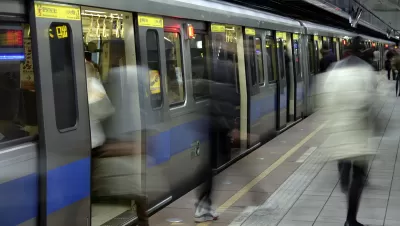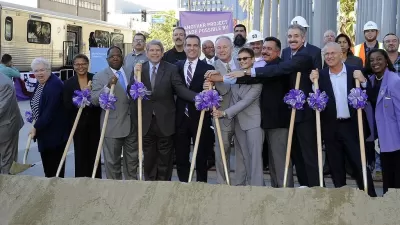Ridership declines mean falling revenues for transit agencies, and could be the beginning of a cycle of service cuts and fare increases leading to yet more ridership declines.

Around the United States, transit ridership is falling. Disappearing bus riders in particular have driven big drops in Miami, Philadelphia, Los Angeles and 31 of 35 large American metro areas. "Researchers concluded factors such as lower fuel costs, increased teleworking, higher car ownership and the rise of alternatives such as Uber and Lyft are pulling people off trains and buses at record levels," Faiz Siddiqui reports for The Washington Post.
The issue isn't merely that ridership is down around the country, but that this drop in ridership may lead to a vicious cycle. "The problem: The declines mean a decrease in farebox recovery, which can often lead to fare increases and reduced service, as in Metro’s case," Siddiqui writes.
"Exceptions to the trend: Seattle, Phoenix and Houston, which either expanded transit coverage and boosted service or underwent ambitious network overhauls, as in Houston’s case," Siddiqui reports. While improving services by reorganizing them or investing in expansions boosted their ridership, it didn't eliminate all the problems associated with cars. "[Seattle], which has some of the worst traffic congestion in the country, hosts about 45,000 Amazon employees and had added 60,000 workers to its center city core since 2010, according to Andrew Glass-Hastings, Director of Transit and Mobility for the Seattle Department of Transportation."
FULL STORY: Falling transit ridership poses an ‘emergency’ for cities, experts fear

Planetizen Federal Action Tracker
A weekly monitor of how Trump’s orders and actions are impacting planners and planning in America.

Map: Where Senate Republicans Want to Sell Your Public Lands
For public land advocates, the Senate Republicans’ proposal to sell millions of acres of public land in the West is “the biggest fight of their careers.”

Restaurant Patios Were a Pandemic Win — Why Were They so Hard to Keep?
Social distancing requirements and changes in travel patterns prompted cities to pilot new uses for street and sidewalk space. Then it got complicated.

Platform Pilsner: Vancouver Transit Agency Releases... a Beer?
TransLink will receive a portion of every sale of the four-pack.

Toronto Weighs Cheaper Transit, Parking Hikes for Major Events
Special event rates would take effect during large festivals, sports games and concerts to ‘discourage driving, manage congestion and free up space for transit.”

Berlin to Consider Car-Free Zone Larger Than Manhattan
The area bound by the 22-mile Ringbahn would still allow 12 uses of a private automobile per year per person, and several other exemptions.
Urban Design for Planners 1: Software Tools
This six-course series explores essential urban design concepts using open source software and equips planners with the tools they need to participate fully in the urban design process.
Planning for Universal Design
Learn the tools for implementing Universal Design in planning regulations.
Heyer Gruel & Associates PA
JM Goldson LLC
Custer County Colorado
City of Camden Redevelopment Agency
City of Astoria
Transportation Research & Education Center (TREC) at Portland State University
Camden Redevelopment Agency
City of Claremont
Municipality of Princeton (NJ)



























